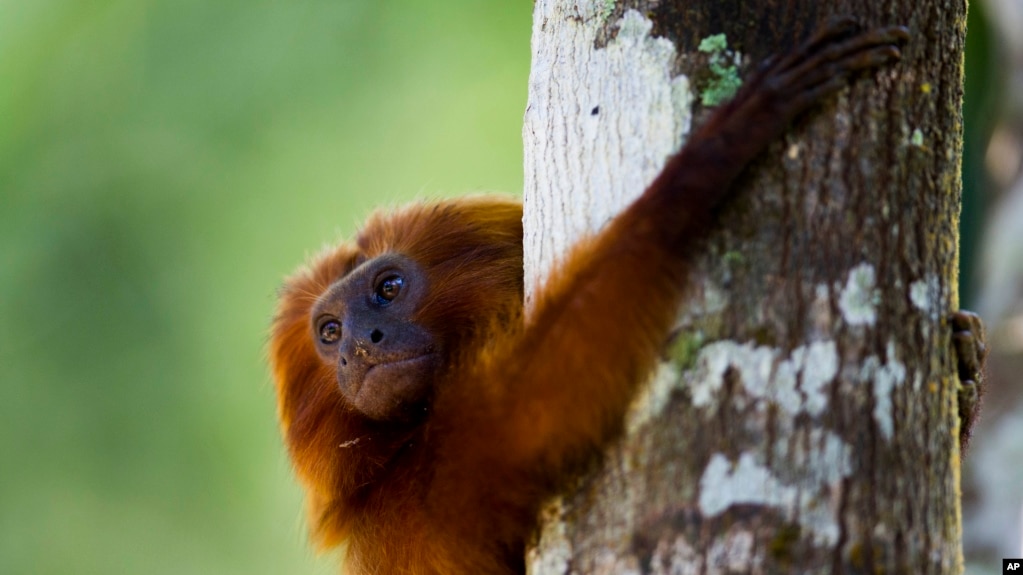
A golden lion tamarin hugs a tree in the Atlantic Forest region of Silva Jardim in Brazil's state of Rio de Janeiro, October 2012. (AP Photo/Felipe Dana)
And now, Words and Their Stories, from VOA Learning English.
Trees give so much to the world. They create oxygen and shade. They provide shelter to animals and insects.
Trees are also a valuable resource. The wood they provide is used for buildings and other products we humans use and need.
Trees are so important that some people have made it their goal to protect them. We (can) call these people “tree huggers.”
Word experts say this term first appeared in the 1900s. It describes people who support the protection of forests and oppose logging – the act of cutting down trees in an area for their wood.
Today, the term “tree hugger” describes a person who is an environmentalist. They want to protect nature and the environment – but not just the trees. Someone who wants to save a rare butterfly species or cut greenhouse gases could also be described as a tree hugger.
Calling someone a “tree hugger” is not always seen as a compliment. In earlier times, in fact, it was used as an insult. “Tree hugger” described someone who was seen as extreme, someone who was overly concerned about protecting trees, animals and other parts of the natural world.
Some tree huggers do go to extremes to protect trees. Take, for example, a woman name Julia Lorraine Hill. She is also known as Julia "Butterfly" Hill. She is an American environmental activist.
For 738 days from December 10, 1997 and December 18, 1999, Hill lived in tree. But not just any tree. She lived in Luna, a Redwood tree in northern California’s Humboldt County.
Luna is huge, measuring nearly 61 meters tall and about 12 meters across. The ancient redwood has stood in Humboldt County for more than 1,000 years. But that did not stop the Pacific Lumber Company from wanting to cut it down.
So, Hill did what any extreme tree hugger would – she moved in!
Hill lived in the tree for just over two years. The Sanctuary Forest website explains that she only came down from the tree when the Pacific Lumber Company agreed to protect Luna with a special conservation agreement.
As the website explains, Hill’s main goal was “to bring international attention to the importance of protecting and restoring natural resources.”
So, we can safely call Hill a tree hugger. And I’m sure that she would consider that the highest of compliments.
And that’s the end of this Words and Their Stories.
Until next time … I’m Anna Matteo!
Well, I saw a tree by the river side
one day as I walked along
Straight as an arrow and pointing to the sky
and growing tall and strong
Anna Matteo wrote this story for VOA Learning English. Ashley Thompson was the editor. At the end of the program, Ken Medema sings “The Tree Song.”
Editor's note: Trees create oxygen and not carbon dioxide. We regret the error.
________________________________________________________________
Words in This Story
species – n. biology : a group of animals or plants that are similar and can produce young animals or plants : a group of related animals or plants that is smaller than a genus
compliment – n. a remark that says something good about someone or something
activist – n. a person who uses or supports strong actions (such as public protests) to help make changes in politics or society
lumber – n. wooden boards or logs that have been sawed and cut for use
restore – v. to put or bring back to an earlier or original state
conservation – n. the protection of animals, plants, and natural resources
Comprehension Quiz
What is tree hugger?